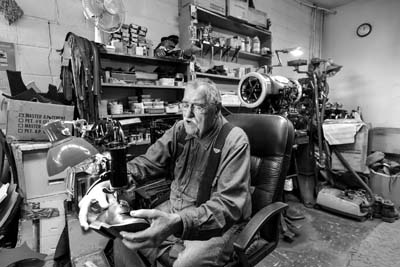Keyser's Cobbler
Following in His Father's Soles
Text and Photos by Carl E. Feather

Hand tools are still part of the cobbler's trade, as Guerino "Reno" Calemine demonstrates in his Keyser shop. Photograph by Carl E. Feather.
Carl E. Feather recently wrote this article about Keyser’s legendary cobbler, Guerino “Reno” Calemine. Sadly, Reno, age 90, died while we were preparing the article for print. “He was the ‘mayor of Keyser,’” says Bart Lay, owner of the Solar Mountain Records shop, next door to Reno’s shoe repair shop. “(His passing) has left a big hole in the community. He lived a great life, right up until a week before he died. He was just rocking.” We thought it would be a fitting tribute to Reno to publish Carl’s Back Roads column in more detail for this issue. –ed.
Guerino Calemine rides to work every day. There are three amazing things about that statement.
One, Guerino is 90 and still works four days a week at his Keyser shoe repair shop at 25 Armstrong Street. Two, except for heavy snow days, his ride is a bicycle. Three, his shop has been around for more than 110 years yet has had only two owners: Guerino and his late father, Dominic.
“My father started in 1904,” Guerino says. With those five words, Guerino, better known in Keyser as “Reno,” begins his father’s story of immigration from Italy, a narrow escape from death, determination, and patriotism, which explains the unusual adjective in his shop’s name: Calemine’sPatriotic Shoe Shop.
“He came here when he was 16 years old,” Reno says. “He came by himself. He landed in Rome, New York, where he paid $5.00 to get a job. He worked a week then was let go. That’s the way they treated immigrants back then.”
Next came a job in a nail factory in Youngstown, Ohio. Then, Dominic received word from a cousin that he could get him a job on the Baltimore and Ohio Railroad at Piedmont in Mineral County.
“He got a job on the work train, and that’s how he ended up in Piedmont,” Reno says of the town near Keyser.
As was the custom, workers played poker in a caboose when the work was done. “Another train came along and collided with their caboose. Two people got killed, and my father’s legs were smashed, all broken,” Reno says.
At the Keyser hospital, Dr. Hoffman insisted on amputating Dominic’s mangled leg. Dominic, unable to speak English, adamantly expressed through an interpreter that he would be extremely “disappointed” with the doctor if that happened. After several impassioned exchanges, the doctor agreed to do surgery. Reno says the doctor wired together the pieces of his father’s shattered leg.
“And you know, I saw an X-ray of that leg when my father was 80 years old, and you could see the wire still in there,” Reno says.
His father spent a year in the hospital; Reno says the railroad paid for his care. A nurse, “Mrs. Romig,” took special interest in the immigrant and taught him how to speak and read English. When Dominic was finally released to resume his life, he decided to stay in Keyser and open a cobbler shop.
Reno says his father learned the trade as a child and teenager in Italy. With Keyser being a railroad town and enjoying prosperity, there was plenty of work to be had, even though the town already had several shoe repair shops. His father set up shop in a frame building on Armstrong Street. The little shop, run by an immigrant with a limp, prospered.
“In 1913, he went back to Italy,” Reno says. “Apparently, he had made enough money that he could afford to close up this place and go back. While he was there, he met his wife, Teresa Calemine. No relation to each other.”
Dominic brought his bride to the United States and resumed his cobbler work in Keyser.
“He liked Keyser, and this is where he wanted to stay,” Reno says. “My father and mother are both buried here.”
When America sent its young men to the battlefields of World War I, Dominic tried to enlist but was rejected due to his injury. So, Dominic did his part by being the most patriotic person in Keyser. He played the part of Uncle Sam in minstrel shows and parades and sold Liberty Bonds at his shop.
“He sold more Liberty Bonds than anybody else around here,” Reno says. “One day, he came to work, and the sign was on his shoe shop: Calemine Patriotic Shoe Shop.”
The name stuck, and to this day, Reno proudly holds fast to the patriotic legacy of his father and mother. The couple had four boys, each of whom served his country. Three became cobblers, as well.
Carlo, the first born, was at Pearl Harbor when the Japanese attacked. He served in the Army Air Corps throughout World War II and received several Purple Hearts.
“He had shrapnel in his head, and they buried him with that in there,” Reno says of his brother, who lived to be 89 and is buried in Wisconsin. He chose a career path other than shoe repair.
You can read the rest of this article in this issue of Goldenseal, available in bookstores, libraries or direct from Goldenseal.